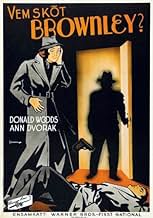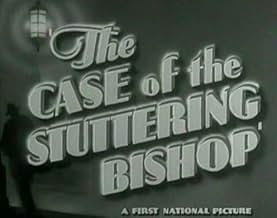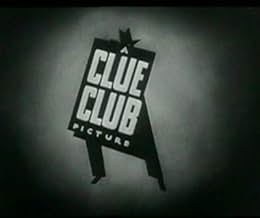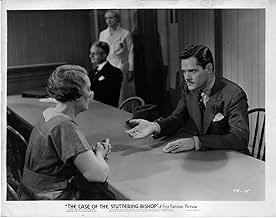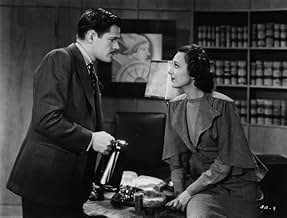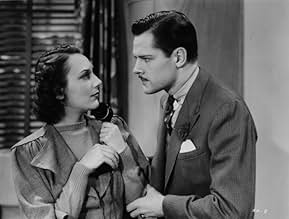Füge eine Handlung in deiner Sprache hinzuAn improbable stuttering bishop from Australia asks for Perry Mason's help in proving the identity of the legitimate heir to a millionaire.An improbable stuttering bishop from Australia asks for Perry Mason's help in proving the identity of the legitimate heir to a millionaire.An improbable stuttering bishop from Australia asks for Perry Mason's help in proving the identity of the legitimate heir to a millionaire.
- Regie
- Drehbuch
- Hauptbesetzung
Helen MacKellar
- Stella Kenwood
- (as Helen McKellar)
Charles C. Wilson
- Hamilton Burger
- (as Charles Wilson)
Eddy Chandler
- Detective James Fleet
- (Nicht genannt)
Empfohlene Bewertungen
Case of the Stuttering Bishop, The (1937)
** 1/2 (out of 4)
Sixth and final film in Warner's Perry Mason series features a new guy in the lead role but the film turns out to be a rather entertaining entry. This time out, Perry Mason (Donald Woods) is visited by a bishop who asks him to investigate a manslaughter that happened twenty-two years earlier but the guilty party is still free. Perry starts to investigate, which leads him to a billionaire who eventually winds up dead and it seems the same person is behind the two cases. This is a pretty strong film that manages to be quite entertaining, although it would have benefited by a stronger supporting cast. Woods is actually very good in the role of Mason and brings his own charm and brains to the role. Ann Dvorak is entertaining as his secretary but the rest of the cast is so-so at best. The case is actually very well written and manages to be quite complicated, which ruins the ending when we get the typical easy way out and that's the guilty person getting away with it until they break down and admit everything.
** 1/2 (out of 4)
Sixth and final film in Warner's Perry Mason series features a new guy in the lead role but the film turns out to be a rather entertaining entry. This time out, Perry Mason (Donald Woods) is visited by a bishop who asks him to investigate a manslaughter that happened twenty-two years earlier but the guilty party is still free. Perry starts to investigate, which leads him to a billionaire who eventually winds up dead and it seems the same person is behind the two cases. This is a pretty strong film that manages to be quite entertaining, although it would have benefited by a stronger supporting cast. Woods is actually very good in the role of Mason and brings his own charm and brains to the role. Ann Dvorak is entertaining as his secretary but the rest of the cast is so-so at best. The case is actually very well written and manages to be quite complicated, which ruins the ending when we get the typical easy way out and that's the guilty person getting away with it until they break down and admit everything.
We had two great evolutionary paths in the 30s. One was an amazing diversity of invention to settle some basic narrative devices that have since served us well as the basic vocabulary of cinema. The other, parallel path was the pulp detective novel, a master of which was Gardner.
The traditional, Holmes form is that you are linked to the detective. You discover what he does. Christie followed this form, but it is difficult to render in film. Gardner may be the first case — since common — of the novel adopting cinematic form. His formula does seem friendly to film: we see events that Mason does not, often before he gets seriously engaged. These events give us a false impression of what happened, so we as viewers start out with a deficit.
Then we have the detection; Mason and company are detectives in act two. The third act is always a courtroom, which is why our detective has to be a lawyer. Courtroom conventions have their own evolution in film, and this instance is limited to what in Christie's stories has to be a contrived assembly of the suspects.
This format allows for more complicated mysteries than were usual in film. My own preference for 30's detection is Philo Vance because the formula was not so strict. But this is a good one in terms of allowing complexity and surprise. We have that here in this solid instance.
One of the decisions in defining the characters is how intimate to make the relationship between alpha male Mason and his pretty and competent secretary. Why this matters has to do, as Mason would say, with motive. We like the guy. He is smart, as smart as other detectives, but why he does what he does
In some renderings of the Mason format, he just likes to win. He has his own Lestrade who he likes humiliating. Justice is incidental, and truth merely a tactic. He just like to strut.
In other renderings, he does what he does because he loves his team, his closest friend Drake and his lover Della. Both are profoundly loyal and true. He struts for her and we imagine passion after the obligatory Italian restaurant scene.
Here, a delicate balance between the two is maintained.
The traditional, Holmes form is that you are linked to the detective. You discover what he does. Christie followed this form, but it is difficult to render in film. Gardner may be the first case — since common — of the novel adopting cinematic form. His formula does seem friendly to film: we see events that Mason does not, often before he gets seriously engaged. These events give us a false impression of what happened, so we as viewers start out with a deficit.
Then we have the detection; Mason and company are detectives in act two. The third act is always a courtroom, which is why our detective has to be a lawyer. Courtroom conventions have their own evolution in film, and this instance is limited to what in Christie's stories has to be a contrived assembly of the suspects.
This format allows for more complicated mysteries than were usual in film. My own preference for 30's detection is Philo Vance because the formula was not so strict. But this is a good one in terms of allowing complexity and surprise. We have that here in this solid instance.
One of the decisions in defining the characters is how intimate to make the relationship between alpha male Mason and his pretty and competent secretary. Why this matters has to do, as Mason would say, with motive. We like the guy. He is smart, as smart as other detectives, but why he does what he does
In some renderings of the Mason format, he just likes to win. He has his own Lestrade who he likes humiliating. Justice is incidental, and truth merely a tactic. He just like to strut.
In other renderings, he does what he does because he loves his team, his closest friend Drake and his lover Della. Both are profoundly loyal and true. He struts for her and we imagine passion after the obligatory Italian restaurant scene.
Here, a delicate balance between the two is maintained.
Maybe you can keep up with the plot convolutions better than I could. Finally I lost track of the yellow or pink or white raincoats and threw in the towel. Anyway, it's a mildly entertaining Mason entry, at best. As a matter of fact, it looks to me like Warner Bros. had lost interest in the series—(for example, compare the sparse production values here with the richly produced The Case of the Curious Bride {1935}). This was the last installment and features a boyish Donald Woods as the legal wizard and sleuth. Frankly, in my book, he lacks the forceful presence required to bring off the role in authoritative fashion, and was, perhaps, a last minute replacement for the more familiar Warren William. Ironically, it's this installment that more closely resembles the TV show with its first-part dramatic setup and second-part courtroom pyrotechnics. Too bad the exotic Ann Dvorak is largely wasted as a recessive Della Street— with her distinctive looks and lively personality, she should have been one of the suspects. All in all, the 70 minutes is for hardcore fans of the series and for fans of the perennially addled Tom Kennedy as the aptly named "Magooney".
The Perry Mason series of mysteries from the 1930s are some of the best mysteries one could watch. One needs to pay attention to details throughout the film to follow the twists in the plot, which in this movie is very complicated. The movies closely follow the Erle Stanley Gardner mystery novels on which they are based. The Case of the Stuttering Bishop holds one's interest from beginning to end as Perry Mason cleverly addresses the case of a murder committed over a will, inheritance and the fraudulent identity of a key player. Donald Woods does not play the role of Perry Mason as well as Warren William did in this series. William plays the role with panache and wit, whereas Donald Woods plays the role straightforward with no flair—serviceable but not exciting. Ann Dvorak plays the role of Della Street straightforward also with none of the sassiness and cuteness of Genevieve Tobin and none of the glamour and screen presence of Helen Trehnolme in other movies in the series. If you are a fan of old, intriguing mysteries, you won't be disappointed with this gem.
You can often tell when a studio is losing interest in a film series when they start replacing the entire cast. In this instance, they did it twice in 2 films-- and by the time of THE CASE OF THE STUTTERING BISHOP, we'd not only seen 3 Perry Masons in 6 films, but 5 different Della Streets! Donald Woods does his 2nd PM film, having played one of the suspects in ...THE CURIOUS BRIDE, while William Clemens directs his 2nd PM film, having already done the relatively sober ...VELVET CLAWS. Clemens would go onto quite a few series films, including a Torchy Blane, 4 Nancy Drews, a Dead Ends Kids, a Philo Vance, and 3 Falcons. There's nothing especially flashy or stylish about this film, and it starts out very confusing, but it is a solid mystery film, and gets better as it goes.
For example, you have the boastful house detective who Perry winds up hiring part-time, and as the story goes on he proves to be genuinely helpful, rather than "merely" comic relief. It seems the murder takes forever to happen in this one, but once it does, the story FINALLY kicks into gear, and the courtroom sequence at the end is probably the BEST in all 6 films. Unlike when Perry rattled off confusing info nobody but HE knew in the previous installment, the quick stream of witness testimonies actually help to pull all the threads of the story together neatly. And at last, there's the patented "blurted out confession" seen in so many PM stories-- only in this case, NOT from the person being grilled on the stand.
It's been said that sometimes casting actors very accurate to novels can lead to dull films. Some of the most popular versions of characters are quite unlike their literary sources-- good examples being Sean Connery's JAMES BOND and Stacy Keach's MIKE HAMMER. In this case, I find myself wishing Warren William had done more films like this one-- his version of Perry might not be thought of as so much of a joke then.
For example, you have the boastful house detective who Perry winds up hiring part-time, and as the story goes on he proves to be genuinely helpful, rather than "merely" comic relief. It seems the murder takes forever to happen in this one, but once it does, the story FINALLY kicks into gear, and the courtroom sequence at the end is probably the BEST in all 6 films. Unlike when Perry rattled off confusing info nobody but HE knew in the previous installment, the quick stream of witness testimonies actually help to pull all the threads of the story together neatly. And at last, there's the patented "blurted out confession" seen in so many PM stories-- only in this case, NOT from the person being grilled on the stand.
It's been said that sometimes casting actors very accurate to novels can lead to dull films. Some of the most popular versions of characters are quite unlike their literary sources-- good examples being Sean Connery's JAMES BOND and Stacy Keach's MIKE HAMMER. In this case, I find myself wishing Warren William had done more films like this one-- his version of Perry might not be thought of as so much of a joke then.
Wusstest du schon
- WissenswertesAuthor Erle Stanley Gardner objected so vehemently to what he felt was the miscasting of Ricardo Cortez as Mason, that Warners replaced him with Donald Woods.
- PatzerNear the end, when Mason and his crew are having lunch during a court recess, Della drops her fork on her plate and reaches out across the table to break off some bread (after giving Mason the inadvertent hunch about Stella Kenwood). When the camera cuts back to Mason, Della has fork in hand again, but not the bread.
- Zitate
Perry Mason: [to Della] Bishops don't often need lawyers. Show him in.
- VerbindungenFeatured in Tote schlafen fest (1946)
- SoundtracksWhen Irish Eyes Are Smiling
(1912) (uncredited)
Music by Ernest Ball
Lyrics by Chauncey Olcott and George Graff
Sung a cappella with a phony Irish brogue by Donald Woods
Top-Auswahl
Melde dich zum Bewerten an und greife auf die Watchlist für personalisierte Empfehlungen zu.
Details
- Erscheinungsdatum
- Herkunftsland
- Sprache
- Auch bekannt als
- Clue Club #10: The Case of the Stuttering Bishop
- Drehorte
- Produktionsfirma
- Weitere beteiligte Unternehmen bei IMDbPro anzeigen
- Laufzeit1 Stunde 10 Minuten
- Farbe
- Sound-Mix
- Seitenverhältnis
- 1.37 : 1
Zu dieser Seite beitragen
Bearbeitung vorschlagen oder fehlenden Inhalt hinzufügen

